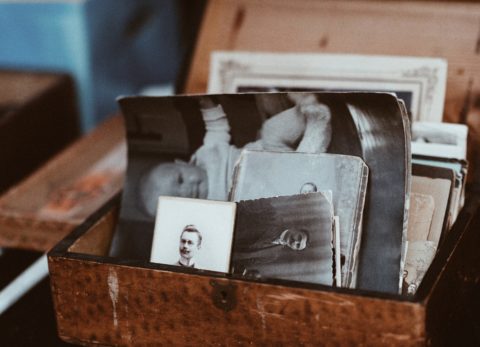Posted on July 24, 3023 by Jenn Zatopek
A few weeks before it happened I was with family at Book People in Austin where I felt drawn to read Joan Didion’s memoir The Year of Magical Thinking. The booksellers described the story in a small placard on the shelf where the book lay in an obscure corner upstairs. After reading how Didion lost her husband and almost lost her adult daughter within five months of each other, I was hooked. This is a woman who knows suffering and isn’t afraid of it, I thought to myself. She will be a good companion if the very worst happens.**
And the very worst did happen: a close relationship was blown to smithereens after my coming out article ran at the end of June. Two days later, my partner and I drove east for tall piney woods and expansive green pastures with docile cows and long walks on narrow country roads, Didion’s work my guide for making sense of what I’d lost. I lamented about the harsh way I’d been treated, how I was abandoned again by a close personal someone, not even being given the space to speak. Didion’s first words of her incisive memoir drifted to mind: Life changes fast / Life changes in an instant / You sit down to dinner and life as you know it ends / The question of self-pity.
It’s easy to fall into self-pity after someone breaks your heart, whether by death or by distance. My experience on that first night of separation was filled with wild confusion and deep pain and unruly hope, thoughts laced with magical thinking that if I just said or did the right thing, all would be well again. I asked others to pray and family to hold me as I wept in fury about not even being given the space to speak. Again, I was faced with the dilemma of someone terminating a relationship with no willingness to hear my side, a firm ending like death. Life as you know it ends. The question of self-pity.
A masterful storyteller but a journalist at heart, Didion’s memoir takes a long look into how she copes with the death of her beloved husband John while her adult daughter Quintana fights for her life at various hospitals around the US. The book is filled with startling insights she’s learned from studying grief, from research written by medical providers to Emily Post’s etiquette advice from last century on how to support someone in mourning, elegiac poems by ee cummings and W. H. Auden and aching grief reflections by C. S. Lewis. Her stark and unapologetic prose rings true as she deftly explores how grief upends the body and brain, makes you feel physically ill from the urgent desire to bring the dead back to life, and causes you to avoid life in strange turns, pushing away memories of time and places that remind you of your loved one.
But what stands out for me more than her scholarly wisdom are Didion’s fresh experiences of grief she captures and writes to us, a generous act of service. I am desperate to endure the wildness of this grief I carry with openhearted awareness, so her vivid flashbacks she reckons with after losing John while traveling to LA to care for Quintana help me relax into allowing this grief to just be here. A native Calfornian who lived in New York City, Didion was back at UCLA Medical Center awaiting Quintana’s slow recovery and flooded with poignant memories of adopting their daughter and working with John in SoCal, both writers who always lived and worked together. The deep love she holds in her heart radiates as you read but the wide canyon of sorrow for what she lost remains with her too.
The first week after the cut-off, I dreamt of my former friend who turned away from me, similar to the only dream I had of my father after he died. After Richard died, I dreamt of him once and he had his back to me, walking away into a dark wooded trail wearing Army Navy pants and forest green Hanes tee shirt and a midnight blue fishing hat. That was the only dream I had of my father since and he’s been dead for fourteen years now, my loss stretched out over the vastness of time. But if I hear Smokey Robison croon “Tears of a Clown” out in public, I am a teenager again, eating potato soup at the Back Porch near the Fort Worth medical school with my dad, the tears afresh in my eyes as if he just died.
After I dreamt of my friend, I remembered how things used to be, awash in the first moments of awakening. Then the dream hit me and I cried again for the loss of the relationship but also the plans we’d made together. Time is the school in which we learn, writes Didion near the end of her book. There is this terrible holding on to the person we were attached to, the love shared which can be celebrated, of course, but then there is the unclenching of the fists, the great suffering and relief that comes from letting go.
Didion ends her story with an honest admission that she would rather not let go but knows the living must relinquish the dead. Her unflinching honesty reminds me of Matthew 8:8 when Jesus says to one of his potential disciples let the dead bury the dead. Christ calls us to be present to what is happening in our lives right here and now rather than getting lost in the mines of death, in what once was. Part of the hardness of life is not really living in the acceptance that so much of our suffering comes from not letting go. Didion’s encouragement, however brutal it is, is to let go of what can no longer be.
As I finish writing, I take heart as I acknowledge I’m in the grips of letting go. I am letting go of this person as a confidante, wishing them well and adieu as I make my way in the world without them. I let go of our regular phone chats and times spent together which enriched my life and theirs. I chose to believe the love we once shared is real and lives on in mysterious ways, offering us both strange solace as we become strangers again. I look at pictures of us and I wonder at the depth of vulnerability it is to love someone and know one day they will leave you, not knowing exactly when or how it will happen.
Today even as I mourn the loss of what was, I feel empowered. At my examen circle, my friend L shared that she is proud that I am letting go of that which seeks to squash my spirit. Yes, I thought, that’s right. The tidal wave of grief hits you hard and you barely come up for breath as the strong waves keep battering you. But then the storm passes and the sea is still again, the clouds lifting and the sun shining on. You swim to shore and realize that what’s left is your strong and courageous heart, choosing to save yourself instead of being pulled under again, whether by harsh words or long-ago suffering. You will, in the end, go on.
**What do you mean if the very worst happens? I mean, I suspected that once my coming out article would run, I would lose relationships. That would be the cost of becoming free. Being queer and hiding this identity for the past three decades was killing me. In the second-half of life, I can no longer pretend to be someone I am not. Not everyone will love, appreciate, and welcome the new life we are trying to live. Some will seek to control us with cruel words, public policy, or religious weaponry, but we, beloveds, will not be tamed.
Photo by Johann Siemens on Unsplash





4 Comments
I have been where you were. I think you are further along on the “Letting go” than I am, though.
July 24, 2023 at 8:53 pmThank you for reading and sharing, Michelle. For me, letting go is a sacred and lifelong practice.
July 29, 2023 at 10:06 amBeautifully and powerfully written. Thank you!
July 31, 2023 at 9:44 pmThanks, Carolyn! I’m grateful for you and your friendship!
August 1, 2023 at 12:23 pm